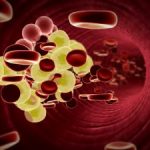 This weekly health news roundup presents our most recent articles on Parkinson’s disease, osteoarthritis, macular degeneration, schizophrenia, and heart attack.
This weekly health news roundup presents our most recent articles on Parkinson’s disease, osteoarthritis, macular degeneration, schizophrenia, and heart attack.
This week we found out about an inhaled medication that may improve symptoms in Parkinson’s disease, high cholesterol may contribute to osteoarthritis, age-related macular degeneration risk may be reduced with the Mediterranean diet. We also discussed delusions in schizophrenia, and the signs and symptoms of a heart attack.
Inhaled medication for Parkinson’s disease may improve symptom management
Advertisement
An inhaled version of a Parkinson’s disease drug may better help manage symptoms related to the progressive neurological disorder. The drug known as levodopa may help alleviate symptoms in between pill dosages.
Levodopa is prescribed to help combat tremors, rigidity, and balance problems which are associated with Parkinson’s disease.
Lead researcher Michael Lipp explained, “Off periods are considered one of the greatest unmet medical needs in the treatment of Parkinson’s, and typically increase in frequency during the course of the disease.” Continue reading…
 High cholesterol may lead to osteoarthritis by causing cartilage cells to die: Study
High cholesterol may lead to osteoarthritis by causing cartilage cells to die: Study
High cholesterol may lead to osteoarthritis by causing cartilage cells to die. Researcher Indira Prasadam said, “Our team has already begun working alongside dietitians to try to educate the public about healthy eating and how to keep cholesterol levels at a manageable level that won’t damage joints, in collaboration with orthopedic surgeons based at Prince Charles Hospital, Brisbane, Australia.”
The researchers used two different animal models to mimic high cholesterol as seen in humans. The first was a mouse model with the altered gene ApoE-/- which leads to high cholesterol. The second was a rat model on a high-cholesterol diet which contributed to high cholesterol.
All rodents underwent a surgery mimicking knee injuries to bring on the development of osteoarthritis. After the surgery, the subjects in both groups were fed either high-cholesterol diet or a normal (control) diet. In both models, those on high-cholesterol diet developed a more severe osteoarthritis, compared to the controls. Continue reading…
 Age-related macular degeneration risk may be reduced with the Mediterranean diet and caffeine: New study
Age-related macular degeneration risk may be reduced with the Mediterranean diet and caffeine: New study
Age-related macular degeneration risk may be reduced with the Mediterranean diet and caffeine. The latest findings found that age-related macular degeneration (AMD) risk was lower among those who ate a Mediterranean diet, especially eating lots of fruits. This is the first study to show the protective effects of caffeine against AMD.
Numerous studies have revealed the benefits of the Mediterranean diet in supporting a healthy heart and brain. The researchers then took it a step further to see how the Mediterranean diet may impact the development of AMD among a group of Portuguese people.
The researchers studied 883 individuals over the age of 55, of which 449 had early AMD and 434 did not have AMD. Diets were assessed using questionnaires asking how often they ate foods that are part of the Mediterranean diet. The researchers found the more frequently participants ate the Mediterranean diet foods the lower their risk of AMD was. Fruits were also seen highly beneficial in maintaining vision and preventing AMD, along with caffeine and antioxidant consumption. Continue reading…
 Schizophrenia and delusions: Types and causes of positive symptoms of schizophrenia
Schizophrenia and delusions: Types and causes of positive symptoms of schizophrenia
It is quite common to experience delusions in schizophrenia which are known as ‘positive symptoms’. The term ‘positive symptoms’ is used to describe something that is believed to be real to the patient but is actually false to everyone else. Delusions are false beliefs that patients actually hold. For example, in paranoid schizophrenia, a common delusion is that someone, or something, is plotting against the patient or their family. Although this is false, the patient believes there is a real threat to their lives, so they become consumed by this perceived threat.
Advertisement
Positive symptoms are more commonly seen in the early stages of schizophrenia and can be provoked or triggered by stressful situations such as a breakup or illness diagnosis. Positive symptoms are also seen as “madness” by the general public. This is because these symptoms evoke fear or anxiety in other people and are often negatively portrayed through media outlets. Unfortunately, these false portrayals foster negative attitude towards schizophrenics even though it is known that these patients do not pose any risk of harm to others. If anything, patients are often more harmful to themselves as opposed to the general public as they embark on risky behaviors and neglect personal care. Continue reading…
 Heart attack warning: Unusual signs and symptoms
Heart attack warning: Unusual signs and symptoms
A heart attack can be a life-threatening event, and that is why recognizing the signs and symptoms is so important to be able to obtain immediate medical attention and prevent complications.
A heart attack occurs when there is not enough oxygenated blood flowing to the heart. If blood flow is not restored quickly, the heart muscle begins to die. Treatment started at the first sign of a heart attack can improve outcomes, but if these symptoms are overlooked then the risk of death increases. Continue reading…
